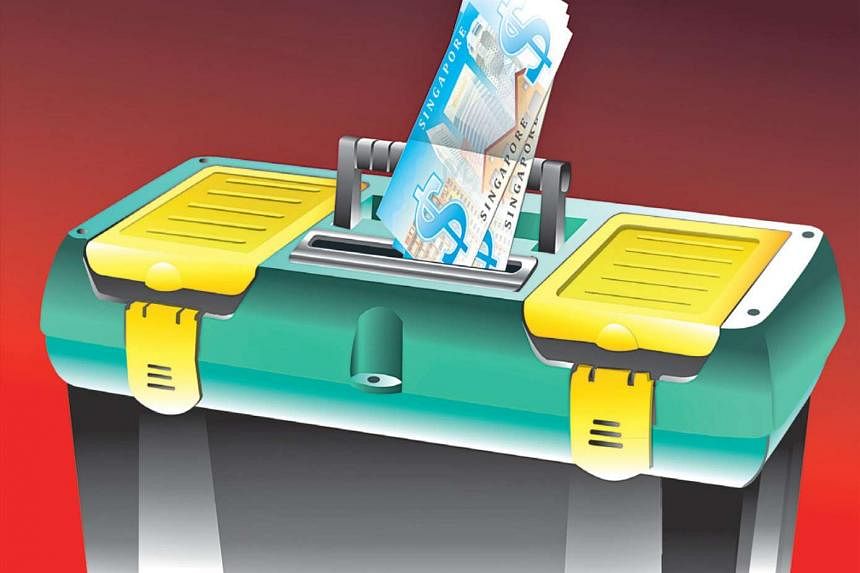At a media event once, I received an unusual door gift - a wall switch from electrical accessories maker Clipsal Industries.
It must have been a long, long time ago as Clipsal listed on the Singapore Exchange in 1992 and delisted in 2006.
I cannot recall what the event was about but I remember wondering about the gift of a wall switch - albeit one with nice decorative patterns on the edges - and its use to a business reporter.
It was all but forgotten until recently when my bathroom light switch could not be toggled on and off.
I riffled through my toolbox - the size of a chest as I'm quite a hoarder - and managed to dig out the Clipsal switch. Its black finishing was a little dulled but otherwise the piece was intact.

With the help of a screwdriver, I switched (pun intended) the old with the new and - voila - the bathroom light was working again.
Of course, it's impossible to disguise the piecemeal work as all the other switches in the house are white.
But I'm still proud that I fixed it without calling in an electrician.
One unintended consequence of the cooling measures on the property market is that it has made it more difficult and inconvenient for people like me to move house.
I live in a spacious Housing Board flat and bought a smaller private property for investment back when the property market was in the doldrums and there were no curbs in place.
At the time, one could trade in an HDB home for another as long as a lock-in duration known as the minimum occupation period was met, regardless of private property ownership as long as the buyer lived in the newly bought flat.
A frothy public housing market, however, put a stop to this. Rules were tweaked in late 2010, which made it mandatory for an HDB flat buyer to dispose of all his residential properties.
Fair enough.
If the rules do not allow me to switch from one flat to another within the public housing space, I am content to stay put as I love HDB living.
But dealing with an ageing flat is another thing. My property has run down 27 years of its 99-year lease.
It has been more than 10 years since the flat was renovated and there are signs of wear and tear everywhere.
Under the old rules, I might have considered buying a resale flat and renovating it before selling the current flat.
Since this avenue is no longer available, I am resigned to sprucing up my place on an ad hoc basis.
Where possible, I try not to rely on outside help.
Cost is an issue. Despite the economic slowdown and a sharp drop in fuel prices, it has become more expensive to get repairmen to make house calls.
I had a leaking bathroom mixer tap a few months ago. A self-employed plumber whom I contacted quoted me $200 to change a new tap, based on the picture of the leak I had sent him on Whatsapp. I baulked, not just at the price, but also the plain-looking tap that he would be providing.
In the end, I went to a Balestier Road shop to get a nice made-in-Italy, chrome-plated tap and fitted it myself for less than what I had been quoted.
Not that I'm particularly brand conscious, but I have found that quality fittings last longer.
To be sure, I don't begrudge the plumber. His price was not unreasonable. It's a tough job; the income invariably fluctuates. There is also no assurance of a fixed rest day, especially during weekends.
As the Singapore economy progresses towards first world standards, the cost of hiring skilled craftsmen is likely to escalate further.
For example, electricians and plumbers in Australia can earn A$100,000 (S$100,448) or more a year. They are similarly well paid in the United States, Britain and the more advanced nations in Europe.
Consequently, residents in these countries have adopted the DIY model as a way of life. It's no surprise that Ikea - the world's biggest do-it-yourself home furnishing company - has its home in Sweden, where the cost of service providers is exorbitant.
While I don't envisage Singapore going the way of the Nordic countries due to our proximity to Johor Baru where labour is still relatively plentiful and cheap, we are raising the game for our semi-skilled and skilled blue-collar workers.
For instance, the National Trades Union Congress has introduced a wage ladder for carpenters that rewards them with higher pay as they become more skilled.
Anyway, learning to do small home repairs can be therapeutic. I derive a certain quiet satisfaction when I succeed with my home fixes.
For that, I have my secondary school education to thank.
In those days, all boys, regardless of their academic standing, were required to take industrial arts as a subject from Secondary 1 to 3.
Workshop sessions took up a large part of the curriculum hours. There were woodwork and metalwork classes that required us to make things such as a hammer, towel rack, serving tray and copper tooling art pieces. Industrial arts was the subject I hated most as none of my products measured up to the required standard and paled in comparison with those made by my classmates.
I wouldn't admit to it then, but I was also terrified of the menacing-looking tools like the electric saws and high-speed drills that generated so much heat we had to pour coolant on them at regular intervals to prevent overheating.
Despite my lack of technical aptitude, I survived and imbibed well the lessons.
Thirty-five years since I downed my tools at the workshop, I am still employing many of the skills I learnt there.
Whether it's swopping a fuse or plug without confusing a live wire for the neutral, or changing a lamp tube ballast, I am able to do so assuredly.
Looking at how the economy is evolving, I believe there is scope today for our secondary schools to teach all boys some technical skills, not just those who are in the vocational stream.
No doubt ,"doing what you do best and outsourcing the rest" remains a key plank of the economy. But at the personal level, it is essential to have a certain degree of life skills, even when one can pay others to do the less economical job, while specialising in a higher value one.



